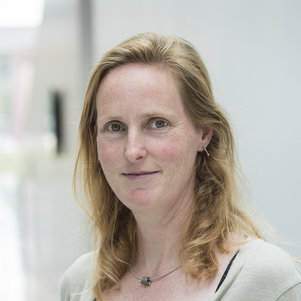Dr.ir. Mirjam Blokker
Profile
Mirjam Blokker has been working at KWR Water Research Institute since 2003 as a researcher in the drinking water infrastructure team. Since the beginning of 2020, I am affiliated with TU Delft for one day a week, as an associate professor).
Mirjam did her MSc at TU Delft in applied physics, with her thesis work on optics. After that she worked in optical fibre telecommunication at Lucent Technologies (Bell Labs), in the Dutch development team. After the internet bubble burst in 2002, in 2003 the research and development work on telecommunications decreased and the Dutch branch was closed. Mirjam changed her line of work to another branch, and focus more on research than on development, and started working at the research institute KWR. Between 2006 and 2010 while working at KWR Mirjam worked on a PhD thesis at the water management department.
Research
Mirjam’s PhD thesis was about water demand modelling (SIMDEUM) and its application in water quality modelling in the drinking water distribution network. Since then SIMDEUM has been widely applied, and is recognized as a unique tool to get realistic demands and discharges. The realistic time series can then be applied in hydraulic models (both upstream and downstream) to study the effect on flows, pressures and water quality.
Joining TU Delft will extend this research, for example with applications in new areas, such as inside the building and in the sewer system. Research on (microbial) water quality in the drinking water distribution system also has a lot of potential, for example related to temperature and discoloured water.
-
Agudelo-Vera, C., Avvedimento, S., Boxall, J., Creaco, E., de Kater, H., Di Nardo, A., Djukic, A., Douterelo, I., Fish, K. E., Iglesias Rey, P. L., Jacimovic, N., Jacobs, H. E., Kapelan, Z., Martinez Solano, J., Montoya Pachongo, C., Piller, O., Quintiliani, C., Rucka, J., Tuhovcak, L. and Blokker, M. (2020). "Drinking Water Temperature around the Globe: Understanding, Policies, Challenges and Opportunities." Water, 12(4), 1049.
-
Bailey, O., Zlatanovic, L., van der Hoek, J. P., Kapelan, Z., Blokker, M., Arnot, T. and Hofman, J. (2020). "A Stochastic Model to Predict Flow, Nutrient and Temperature Changes in a Sewer under Water Conservation Scenarios." Water, 12(4), 1187.
-
Blokker, E., van Osch, A., Hogeveen, R. and Mudde, C. (2013a). "Thermal energy from drinking water and cost benefit analysis for an entire city." Journal of Water and Climate Change, 4(1), 11-16.
-
Blokker, E. J. M., Agudelo-Vera, C., Moerman, A., van Thienen, P. and Pieterse-Quirijns, E. J. (2017). "Review of applications for SIMDEUM, a stochastic drinking water demand model with a small temporal and spatial scale." Drinking Water Engineering and Science, 10(1), 1-12.
-
Blokker, E. J. M., Pieterse-Quirijns, E. J., Vreeburg, J. H. G. and van Dijk, J. C. (2011). "Simulating Nonresidential Water Demand with a Stochastic End-Use Model." Journal of Water Resources Planning and Management, 137(6), 511-520.
-
Blokker, E. J. M., van de Ven, B. M., de Jongh, C. M. and Slaats, P. G. G. (2013b). "Health Implications of PAH Release from Coated Cast Iron Drinking Water Distribution Systems in the Netherlands." Environmental Health Perspectives.
-
Blokker, E. J. M., Vreeburg, J. H. G., Beverloo, H., Klein Arfman, M. and van Dijk, J. C. (2010a). "A bottom-up approach of stochastic demand allocation in water quality modelling." Drink. Water Eng. Sci., 3(1), 43-51.
-
Blokker, E. J. M., Vreeburg, J. H. G. and van Dijk, J. C. (2010b). "Simulating residential water demand with a stochastic end-use model." Journal of Water Resources Planning and Management, 136(1), 19-26, doi:10.1061/(ASCE)WR.1943-5452.0000002.
-
Blokker, M., Smeets, P. and Medema, G. (2018). "Quantitative microbial risk assessment of repairs of the drinking water distribution system." Microbial Risk Analysis, 8, 22-31, doi:https://doi.org/10.1016/j.mran.2017.12.002.
-
van Summeren, J. and Blokker, M. (2017). "Modeling particle transport and discoloration risk in drinking water distribution networks." Drink. Water Eng. Sci., 10(2), 99-107, doi:10.5194/dwes-10-99-2017.
- Topical editor bij DWES
- Member of TVVL expert group on sanitation technology
-
Blokker, E. J. M., Büscher, C. H., Palmen, L. J. and Agudelo-Vera, C. A. (2019). Future drinking water infrastructure, building blocks for drinking water companies for their strategic planning (Open Access), KWR, IWA. Book - Open Access - eBook eIBN: 9781789060485 DOI: 10.2166/9781789060485.
-
Speight, V., Quintiliani, C., Schaap, P., Husband, S. P., van Summeren, J. R. G., Kapelan, Z., Creaco, E., Blokker, E. J. M., Calero Preciado, C., Douterelo Soler, I. and Boccelli, D. L. (2020). Guidance Manual - The Wat-Qual Consortium - Water Quality in Drinking Water Distribution Systems, KWR, Nieuwegein. Book 402072 European Union, Horizon 2020.

Mirjam Blokker
Senior researcher / lecturer
- M.Blokker@tudelft.nl
-
Faculty of Civil Engineering and Geosciences
Building 23
Stevinweg 1
2628 CN Delft
Availability:
Thursday